Summary.
In this paper, we perform the numerical analysis of operator splitting techniques for nonlinear reaction-diffusion systems with an entropic structure in the presence of fast scales in the reaction term. We consider both linear diagonal and quasi-linear non-diagonal diffusion; the entropic structure implies the well-posedness and stability of the system as well as a Tikhonov normal form for the nonlinear reaction term [23]. It allows to perform a singular perturbation analysis and to obtain a reduced and well-posed system of equations on a partial equilibrium manifold as well as an asymptotic expansion of the solution. We then conduct an error analysis in this particular framework where the time scale associated to the fast part of the reaction term is much shorter that the splitting time step Δt thus leading to the failure of the usual splitting analysis techniques. We define the conditions on diffusion and reaction for the order of the local error associated with the time splitting to be reduced or to be preserved in the presence of fast scales. All the results obtained theoretically on local error estimates are then illustrated on a numerical test case where the global error clearly reproduces the scenarios foreseen at the local level. We finally investigate the discretization of the corresponding problems and its influence on the splitting error in terms of the previously conducted numerical analysis.
Similar content being viewed by others
References
Akrivis, G., Crouzeix, M., Makridakis, C.: Implicit-explicit multistep methods for quasilinear parabolic equations. Numer. Math. 82(4), 521–541 (1999)
Bennett, B.A.V., Smooke, M.D.: The effect of overall discretization scheme on Jacobian structure, convergence rate and solution accuracy within the local rectangular refinement method. Numer. Linear Algebra Appl. 8(8), 513–536 (2001). Solution methods for large-scale non-linear problems (Pleasanton CA 2000)
Besse, C., Bidégaray, B., Descombes, S.: Order estimates in time of splitting methods for the nonlinear Schrödinger equation. SIAM J. Numer. Anal. 40(1), 26–40 (electronic) (2002)
Blouza, A., Coquel, F., Hamel, F.: Reduction of linear kinetic systems with multiple scales. Combust. Theory Model. 4(3), 339–362 (2000)
D’Angelo, Y.: Analyse et Simulation Numérique de Phénomènes liésà la Combustion Supersonique Ph.D thesis. Ecole Nationale des Ponts et Chaussées, 1994
D’Angelo, Y., Larrouturou, B.: Comparison and analysis of some numerical schemes for stiff complex chemistry problems. RAIRO Modél. Math. Anal. Numér. 29(3), 259–301 (1995)
Descombes, S.: Convergence of a splitting method of high order for reaction-diffusion systems. Math. Comp. 70(236), 1481–1501 (2001)
Giovangigli, V.: Multicomponent flow modeling. Birkhäuser Boston Inc. Boston, MA, 1999
Giovangigli, V., Massot, M.: Asymptotic stability of equilibrium states for multicomponent reactive flows. Math. Models Methods Appl. Sci. 8(2), 251–297 (1998)
Giovangigli, V., Massot, M.: The local Cauchy problem for multicomponent reactive flows in full vibrational non-equilibrium. Math. Methods Appl. Sci. 21(15), 1415–1439 (1998)
Giovangigli, V., Massot, M.: Entropic structure of multicomponent reactive flows with partial equilibrium reduced chemistry. Math. Methods Appl. Sci. 2003. To appear http://numerix.univ-lyon1.fr/publis/publiv/2001/326/publi.ps.gz
Gokoglu, S.A.: Significance of vapor phase chemical reactions on CVD rates predicted by chemically frozen and local thermochemical equilibrium boundary layer theories. J. Electrochem. Soc., 1988
Hairer, E., Wanner, G.: solving ordinary differential equations II stiff and differential-algebraic problems. Springer-Verlag, 1991
Hindmarsh, A.C.: ODEPACK a systematized collection of odesolvers in scientific computing. North-Holland, Amsterdam, 1983
Kato, T.: Perturbation theory for linear operators. Springer-Verlag, Berlin, second edition, 1976. Grundlehren der Mathematischen Wissenschaften, Band 132
Kawashima, S.: Systems of hyperbolic-parabolic composite type, with application to the equations of magnetohydrodynamics. PhD thesis, Kyoto University, 1984
Kawashima, S., Shizuta, Y.: On the normal form of the symmetric hyperbolic-parabolic systems associated with the conservation laws. Tohoku Math. J. (2) 40(3), 449–464 (1988)
Kim, J., Cho, S.Y.: Computation accuracy and efficiency of the time-splitting method in solving atmosperic transport-chemistry equations. Atmos. Environ., 1997
Kuznetsov, Yu.A., Levitin, V.V.: CONTENT : A multiplatform environment for analyzing dynamical systems. Dynamical Systems Laboratory, Centrum voor Wiskunde en Informatica, Amsterdam, 1996. http://ftp.cwi.nl
Lam, S.H., Goussis, D.A.: The csp method for simplifying kinetics. Int. J. of Chem. Kin. 26, (1994)
Maas, U., Pope, S.B.: Simplifying chemical kinetics : intrinsic low dimensional manifold in composition space. Combustion and Flame 88, 239–264 (1992)
Marchuk, G.I.: Splitting and alternating direction methods. In: Handbook of numerical analysis. Vol. I, North-Holland, Amsterdam, 1990, pp. 197–462.
Massot, M.: Singular perturbation analysis for the reduction of complex chemistry in gaseous mixtures using the entropic structure. Discrete Contin. Dyn. Syst. Ser. B 2(3), 433–456 (2002)
McRae, G.J., Goodin, W.R., Seinfeld, J.H.: Numerical solution of the atmospheric diffusion equation for chemically reacting flows. J. Comput. Phys. 45(1), 1–42 (1982)
Noskov, M., Smooke, M.D.: Primitive variable solver for modeling steady-state and time-dependent laminar flames with detailed chemistry and transport. In: Proceeding of the First M.I.T. Conference on Computational Fluid and Solid Mechanics, June 2001, pp. 1338–1341
Noskov, M., Smooke, M.D.: use of higher-order methods for modeling laminar diffusion flames with detailed chemistry and transport propertie. In: Proceedings of the Fall Technical Meeting, Eastern States Section of the Combustion Institute, Dec. 2001, pp. 237–240
Saad, Y.: Parallel iterative methods for sparse linear systems. In: Inherently parallel algorithms in feasibility and optimization and their applications (Haifa 2000) North-Holland, Amsterdam, 2001, pp. 423–440
Saad, Y., Axelsson, O., Duff, I., Tang, W.-P., van der Vorst, H., Wathen, A.: Preconditioning techniques for large sparse matrix problems in industrial applications. John Wiley & Sons Ltd., Chichester, 2000. Papers from the International Conference (SPARSE ‘99) held at the University of Minnesota, Minneapolis, MN, June 10–12, 1999 Numer. Linear Algebra Appl. 7(7-8), (2000)
Schatzman, M.: Toward non commutative numerical analysis : high order integration in time. J. Sci. Comput. 17(1-3), 107–125 (2002)
Schweitzer, J.M., Galtier, P., Schweich, D.: A single events kinetic model for the hydrocracking of paraffins in a three-phase reactor. Chem. Eng. Science, pp. 2441–2452 (1999)
Smooke, M.D., Giovangigli, V.: Numerical modeling of axisymmetric laminar diffusion flames. Impact Comput. Sci. Engrg. 4(1), 46–79 (1992)
Smooke, M.D. editor: reduced kinetic mechanisms and asymptotic approximations for Methane-Air Flames, Vol. 384. Springer Verlag, 1991
Sportisse, B.: Contribution à la modélisation des écoulements réactifs : réduction des modèles de cinétique chimique et simulation de la pollution atmosphérique. PhD thesis, Ecole Polytechnique, 1999
Sportisse, B.: An analysis of operator splitting techniques in the stiff case. J. Comput. Phys. 161(1), 140–168 (2000)
Strang, G.: Accurate partial difference methods. I. Linear Cauchy problems. Arch. Ration. Mech. Anal. 12, 392–402 (1963)
Strang, G.: On the construction and comparison of difference schemes. SIAM J. Numer. Anal. 5, 506–517 (1968)
Pu, Sun.: A Pseudo non-time splitting method in air quality modeling. J. Comp. Phys., 1996
Témam, R.: Sur l’approximation de la solution des équations de Navier-Stokes par la méthode des pas fractionnaires. I. Arch. Rational Mech. Anal. 32, 135–153 (1969)
Témam, R.: Sur l’approximation de la solution des équations de Navier-Stokes par la méthode des pas fractionnaires. II. Arch. Rational Mech. Anal. 33, 377–385 (1969)
Tikhonov, A.N., Vasil’eva, A.B., Sveshnikov, A.G.: Differential equations. Springer-Verlag, Berlin, 1985
Tuckerman, L.S., Barkley, D.: Bifurcation analysis for timesteppers. In: Numerical methods for bifurcation problems and large-scale dynamical systems (Minneapolis MN 1997), Springer, New York, 2000, pp. 453–466
Tuckerman, L.S., Bertagnolio, F., Daube, O., Le Quéré, P., Barkley, D.: Stokes preconditioning for the inverse Arnoldi method. In: Continuation methods in fluid dynamics-Aussois 98, Vieweg, Braunschweig, 2000, pp. 241–255
Verwer, J.G., Sportisse, B.: A note on operator splitting in a stiff linear case. Technical report, MAS-R9830, 1998
Vishik, M.I.: Asymptotic behaviour of solutions of evolutionary equations. Cambridge University Press, Cambridge, 1992
Yanenko, N.N.: The method of fractional steps. The solution of problems of mathematical physics in several variables. Springer-Verlag, New York, 1971
Author information
Authors and Affiliations
Corresponding author
Additional information
Mathematics Subject Classification (2000): 65M12, 35K57, 35B25, 35Q80, 34E15, 80A32, 92E20
Rights and permissions
About this article
Cite this article
Descombes, S., Massot, M. Operator splitting for nonlinear reaction-diffusion systems with an entropic structure : singular perturbation and order reduction. Numer. Math. 97, 667–698 (2004). https://doi.org/10.1007/s00211-003-0496-3
Received:
Revised:
Published:
Issue Date:
DOI: https://doi.org/10.1007/s00211-003-0496-3




